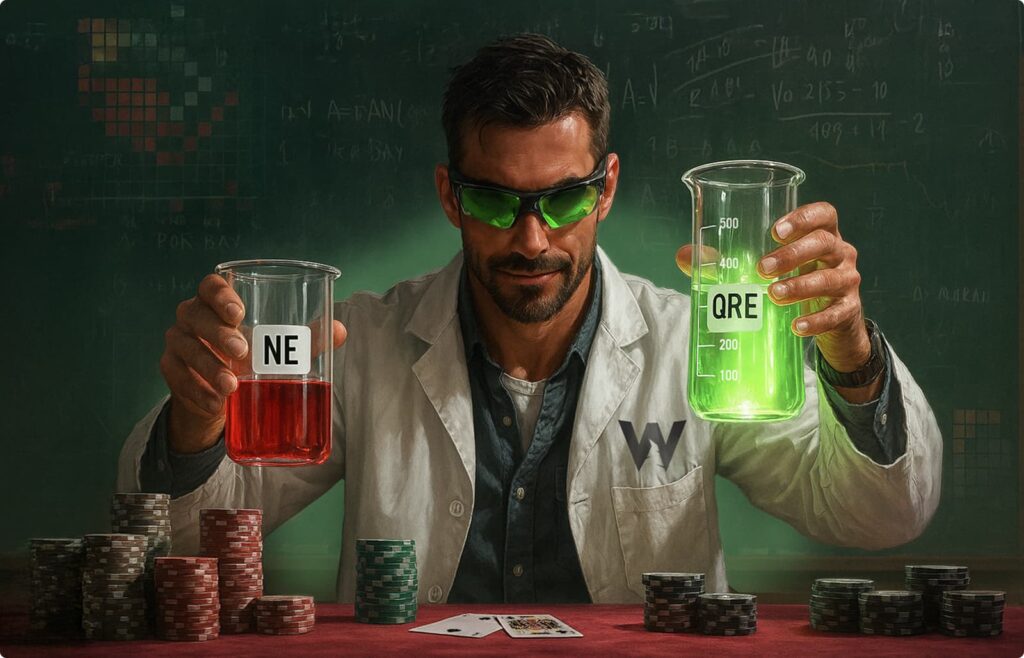Quantal Response Equilibrium (QRE) is being introduced as the next evolution of GTO solving. It’s a groundbreaking new approach for solving optimal poker strategy, poised to become the state-of-the-art and challenge the Nash equilibrium paradigm that has been the gold standard for the last decade.

What is QRE?
At its core,
QRE differs from Nash equilibrium by intentionally introducing “mistakes” into the solution at a low frequency, unlike Nash equilibrium, which assumes perfect rationality.
Why is QRE the Next Evolution?
- Handling Ghost Lines: Nash equilibrium solvers struggle with nodes that aren’t supposed to happen in a perfect GTO strategy, known as “ghost lines” or 0% frequency lines. QRE optimizes the strategy everywhere, providing well-defined strategies even in these uncommon spots.
- Rational Mistakes: QRE introduces “mistakes” rationally, with minus EV actions taken at a very small frequency. The larger the EV loss, the less likely the mistake, resulting in intuitive perceived opponent ranges in ghost lines.
- Goal: QRE aims to create a highly accurate strategy by introducing the minimum amount of mistakes needed for good responses against ghost lines, not to model “donkey behavior”.
- Relationship to Nash: QRE mirrors Nash in common spots but diverges significantly in uncommon, ghost line scenarios. QRE strategies, similar to Nash, are nearly unexploitable.
- GTOWizard AI Implementation: GTOWizard now uses QRE for custom solutions, while pre-solved solutions still use Nash.
- History: QRE, first published around 1995, has been used in fields like economics and political science, recognized as a better model of human behavior due to people being “somewhat irrational creatures”. GTOWizard AI is the first poker solver to employ QRE.
Key Benefits of QRE for Poker Players
- Capturing More EV: QRE’s improved handling of ghost lines allows players to capture more EV against real-world mistakes.
- No Need for Node Locking: QRE’s rationality premise reduces the need for node locking to get good responses to unexpected lines.
- Outperformance Against Imperfect Opponents: QRE is expected to outperform Nash equilibrium against imperfect opponents, leading to better real-world results.
- Learning: QRE allows players to observe and learn how to punish rational mistakes.
- Improved Training Experience: QRE provides a well-defined strategy in ghost lines, enhancing the training experience.
- Faster Solve Times: QRE tends to lead to faster solve times, especially in complex game trees, with a much lower maximum solving time.
- Crucial for Future Developments: QRE is essential for solving more complicated spots like multi-way pots and other future engine upgrades.
Benchmarks
Benchmarks indicate that QRE leads to a 25% more accurate strategy on the flop and is 38 times better according to Tree Payoff Weighted Loss (TPWL), a metric measuring strategy quality at every node. While exploitability remains the primary metric, TPWL highlights QRE’s superior performance at individual nodes, which is crucial against opponents who make mistakes.
In conclusion, Quantal Response Equilibrium represents a significant advancement in poker solver technology, offering more robust and practical solutions for real-world play.
